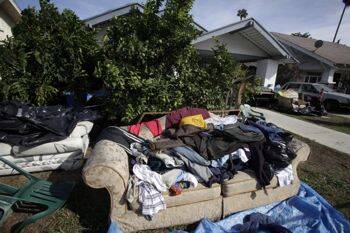With the median length of unemployment reaching 10 months and more than four job seekers for every opening, Congress must find ways to continue unemployment compensation to protect jobless workers and their families, said the chairman of the U.S. bishops' Committee on Domestic Justice and Human Development. "For millions of American workers and their families, economic hardship continues and grows," said Bishop Stephen E. Blaire of Stockton, Calif., in a Dec. 12 letter to House members. "The U.S. Catholic bishops have long advocated that the most effective way to build a just economy is the availability of decent work at decent wages," he added. "When the economy fails to generate sufficient jobs, there is a moral obligation to help protect the life and dignity of unemployed workers and their families." Millions will lose their unemployment benefits beginning Jan. 1. Bishop Blaire urged the House members to "consider the moral and human consequences of your decisions on the most vulnerable among us, especially unemployed workers and their families." With 15 percent of all Americans—including one in four children—living in poverty, the campaign will promote awareness about domestic poverty and provide resources including an interactive poverty tour and a monthlong Facebook event. Daily activities on Facebook beginning Jan. 1 will be aimed at building greater understanding about poverty in the United States. The content is recommended for use by diocesan social action directors, Catholic Campaign for Human Development directors and program coordinators, parish social ministry leaders, teachers and others. Bishop Jaime Soto of Sacramento, Calif., chairman of the bishops' CCHD subcommittee, said the Catholic culture of life "begins with a love that binds us to the hopes and joys, the struggles and the sorrows of people, especially those who are poor or (in) any way afflicted. We march with immigrant families toward a society made stronger and safer by their inclusion," he added. "We embrace the mother and her unborn child, giving to both of them hope and opportunity. We measure our own health by the quality of care we give to those most vulnerable. We labor with those whose work is burdensome."
Bishop Urges Congress to Remember Unemployed
Show Comments (
)
Comments are automatically closed two weeks after an article's initial publication. See our comments policy for more.
The latest from america
This week, a music festival returns to the Chiquitos missions in Bolivia, which the Jesuits established between 1691 and 1760. The story of the Jesuit "reductions" was made popular by the 1986 film ‘The Mission.’
The world can change for the better only when people are out in the world, “not lying on the couch,” Pope Francis told some 6,000 Italian schoolchildren.
Our theology of relics tells us something beautiful and profound not only about God but about what we believe about materiality itself.
"3 Body Problem" is an imaginative Netflix adaptation of Cixin Liu's trilogy of sci-fi novels—and yet is mostly true to the books.








